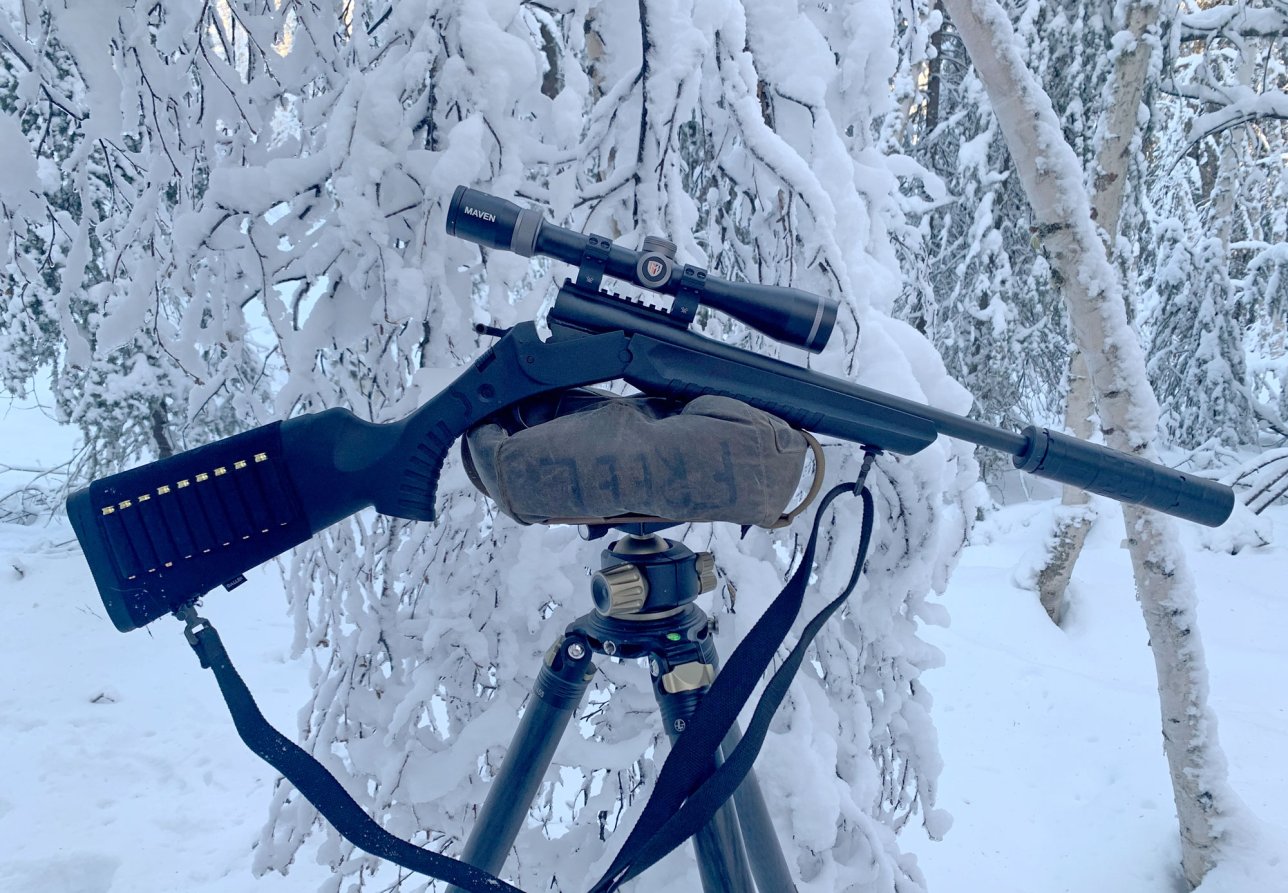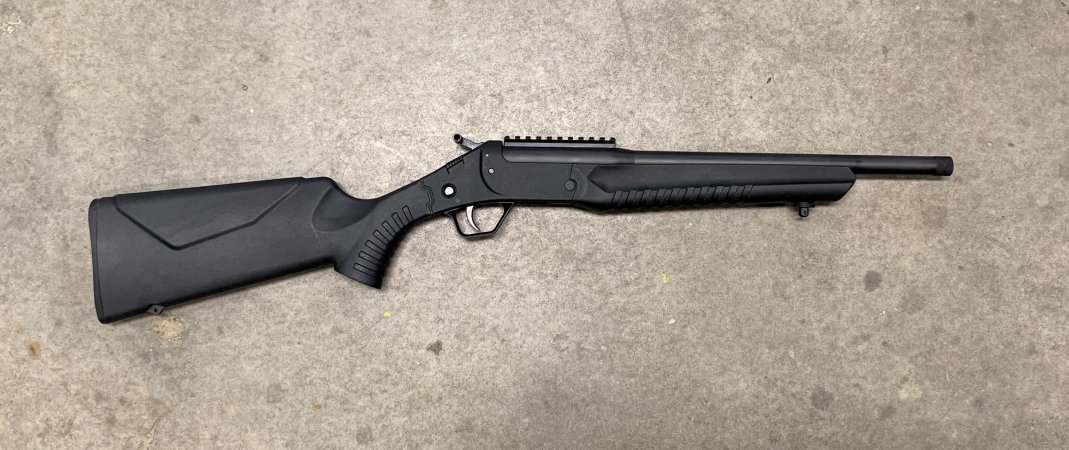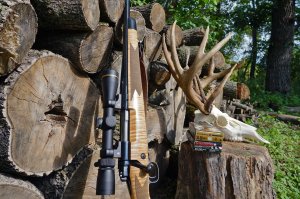We may earn revenue from the products available on this page and participate in affiliate programs. Learn More ›
The Rossi LWC, which stands for “lightweight carbine,” is cheap and inelegant. But this little single shot rifle will, no doubt, be an appealing option for big-woods deer hunters who just want a gun that works. At Outdoor Life, we have a proud history of testing the latest and finest hunting rifles, but we also place a lot of weight on value. Like you, the everyday reader, at times we’ve had to scrap and save and choose where to spend our money on guns and hunting gear, and sometimes a budget-priced hunting rifle is the right answer.
Budget hunting rifles have held a special place in my heart since I saved up to purchase a brand new Remington Model 710 when I was 15. My purchase was influenced by a couple of glowing magazine reviews and the $350 price tag. The rifle has some significant drawbacks, but I used it to kill a lot of critters and make even more memories. Just for kicks, I took it out and killed another caribou with it a couple years ago.
The Rossi LWC is the least expensive, new centerfire deer rifle we could find, and for the aspiring young whitetail hunter, or someone who simply wants an affordable, simple rifle that’s surprisingly accurate, it’s a great option.
Rossi LWC Specs
- Action: Break-action
- Stock: Injection-molded polymer
- Cartridge: .350 legend (tested), 5.56mm, .300 BLK, .357 Mag., .44 Mag., 8.6 BLK, and 6.5 CM
- Capacity: 1 round
- Weight: 5 pounds, 7 ounces (measured)
- Trigger: 3 pounds, 15 ounces (measured)
- Barrel: 16.6 inches, 1:16 twist, threaded 5/8-24
- Finish: Black Oxide
- Length: 31.75 inches (measured)
- Optic mounting: Picatinny rail
- Price: $304
Key Features
- Steel receiver overmolded with polymer
- Crossbolt and transfer-bar safety mechanisms
- Easy takedown
- Non-ejecting extractor
Review Highlights
- Threaded muzzle makes it a great suppressor host
- Straight-wall cartridges can hang up on extractor while loading
- Hammer spur extension can the installed on left or right side
- Optic-ready
- Most Accurate .350 Legend single-shot I have tested
- 100-yard Accuracy Average: 1.904 inches (average of 20 five-shot groups with six types of ammunition)

The Rossi LWC: A Simple, Straightforward Single Shot
There isn’t any secret to the Rossi LWC’s affordable price tag. It’s a simple break-open single-action design with injection-molded polymer furniture and black-oxide-coated steel components. Like many similar rifle and shotgun designs, the fore-end is removable, and the barrel can be removed from the receiver. The receiver itself is steel, but overmolded with polymer that matches the fore-end and buttstock. The only thing that caught a negative look from me upon inspection was a sloppy weld attaching the fore-end stud to the barrel.
Controls on the Rossi LWC are like what you’ll find on similar break-actions. It’s got a polymer-coated release lever that opens the action, and a hammer that’s drawn rearward to cock the rifle. The Rossi has a cross-bolt safety switch, but also operates with a transfer bar mechanism. Like those on newer revolvers, the transfer bar allows the hammer to be fully lowered and rest against the receiver without contacting the firing pin. The 3-pound, 14-ounce trigger isn’t bad, and has only a minimal amount of creep.
The LWC has a mechanical extractor that lifts the unfired cartridge or fired case slightly from the chamber when the action is opened, but does not use a spring-powered ejector. You must remove the spent cases by hand. The 16.5-inch barrel, especially without a bolt-action or semi-auto receiver behind it, makes for a short, handy package, even when paired with a suppressor.

Optic and Suppressor
Despite the bargain basement price, it pleases me to see that Rossi included a section of Picatinny rail on the receiver and threaded the muzzle of the LWC. This makes the rifle plug-and-play for both optics and suppressors. For a budget deer-rifle package, I’d pair the .350 Legend model I tested with something like a Vortex Crossfire II with the straight-wall BDC reticle. For someone who hunts the woods, an affordable red dot like the Vortex Sparq would work really well and handle the mild recoil of the .350 Legend adequately.
The appeal of this little single-shot rises exponentially when you can equip it with a suppressor. Given that virtually any suppressor —especially when coupled with the transfer tax — will cost significantly more than this rifle, it might not be realistic if you’re really pinching pennies. However, this rifle is a stupid amount of fun to shoot when suppressed. If you’ve already got a suitable suppressor, this is a great platform for it. The Rossi LWC is available in other popular super/subsonic calibers like .300 Blackout and 8.6 Blackout.
Read Next: Best Rifle Scopes Under $500
Rossi LWC in .350 Legend: Accuracy
We take our accuracy testing seriously at Outdoor Life. We want to give you the best information and most reasonable expectations for a rifle you might consider purchasing. I tested the Rossi LWC with six different types of .350 Legend ammo and recorded a total of 20 5-shot groups at 100 yards. Like many of the other .350 Legend rifles I’ve tested, the Rossi LWC shot some ammo really well, and others poorly. Worst groups were seen with Winchester Deer Season XP (3.5 inches) and Federal 180-grain Power-Shok (4.2 inches). The best-performing ammunition was Barnes 170-grain TSX, which averaged 1.3-inch five-shot groups (six groups total), and Federal 160-grain Fusion, which averaged 1.5-inch 5-shot groups (4 groups).
Average of all five-shot group sizes: 1.904 inches (20 groups)
Barnes 170-grain TSX 20-shot group aggregate: 1.98 inches

Because the .350 Legend is effectively a sub-150-yard deer cartridge, using 20-shot group data to establish the rifle’s cone of dispersion isn’t as important as with rifles intended for longer-distance hunting. Still, it was incredible to see the Rossi print a sub-two-inch aggregate with Barnes ammo. Any hunting rifle that will do that is totally adequate, and one that will print under 1.5 inches is a great shooter. Even considering only five-shot group data, the Rossi LWC is more accurate than both the other single-shot .350 Legend rifles I’ve tested: the Traditions Outfitter and Henry Single Shot, which averaged 2.30 and 2.33 inches respectively for average of all five-shot groups.
The Rossi LWC lines up quite well with other, more expensive options in the budget-priced rifles category that we’ve tested in .308 too — not just single-shot .350 Legends. From that testing, the Rossi averaged better groups than the Mossberg Patriot Predator (2.178-inch average) and the Winchester XPR (2.234-inch average). It virtually tied the Savage Axis (1.902-inch average), and was edged out by the Ruger American, which averaged 1.720-inch groups.
Bottom line, this bargain-priced .350 Legend is plenty accurate to take to the woods.
Minimal Investment, Maximum Fun
In addition to solid accuracy at a bargain price, there’s something to be said for having a rifle we aren’t afraid to make our own. First, it’s sometimes nice to have a rifle that I’m no worried about babying. Second, when we aren’t emotionally invested in keeping a rifle pristine, we have the freedom to answer some of our what-ifs, and even make some modifications. Add a cheek piece or fasten a piece of ARCA to the fore-end, who cares? You’re not defacing the Mona Lisa.
The single-shot rifle is a great kid’s platform, and the short barrel makes this rifle handy and maneuverable in a hunting blind. For smaller kids, it can be tough to find a centerfire rifle that fits them. Got one of these Rossis? Just chop the stock down, put some expanding foam in it, and stick a butt pad on there.
Read Next: Smith & Wesson 351 PD Review
Drawbacks of the Rossi LWC
There’s no free lunch, and you can’t expect to get a $300 hunting rifle without some potential drawbacks or limitations. First, the polymer furniture is a little bit loud and cumbersome. I’m not sure how I feel about the durability of the action release lever either. Rather than a toggle-style lever, this is more of a button that could potentially get jammed up. The black oxide finish on the steel of this rifle will probably corrode easily and you’ll either need to maintain it well or just embrace the patina.
On traditional muzzleloading rifles and many modern hammer-fired guns, you can cock the hammer silently by holding the trigger, pulling the hammer to the rear, then releasing the trigger and slowly letting go of the hammer spur. There’s no way to cock the Rossi LWC without the characteristic click of the sear engaging. If hunting in a stand, I’d cock, then engage the crossbolt safety.
The only significant function-related issue I had was that the necks on the straight-walled .350 Legend hang up on the extractor when trying to chamber a round. It takes too much manipulation and effort to get rounds chambered quickly.

Final Thoughts on the Rossi LWC
For all our celebration of the nicest rifles with the most svelte features and precise performance, we recognize that simple tools can often get the job done just as well. Sure, some hunters may coddle their pristine high-grade-walnut Remington or Winchester in the woods and call it the ultimate deer rifle. But when I look at the Rossi LWC, I think of the redneck (I use this term as a compliment) deer hunter who will probably tape a piece of foam pool noodle to the stock for a cheek piece, put a cheap scope on the Picatinny rail, top it off with a suppressor, rattle-can-camo the whole thing, and kill every deer to walk within 100 yards of the stand for the next 10 years with it. That’s what I’d do anyway.


